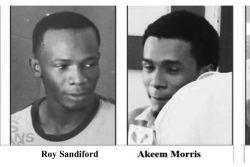(Trinidad Guardian) Sanatan Dharma Maha Sabha (SDMS) secretary general Satnarayan Maharaj and the organisation’s media company Central Broadcasting Services have won their lawsuit over the refusal of the T&T Police Service (TTPS) to disclose the warrant used to search Radio and TV Jaagriti, in April.
Delivering a 28-page judgement at the Hall of Justice in Port-of-Spain, yesteday afternoon, High Court Judge Ronnie Boodoosingh upheld the judicial review lawsuit brought by Maharaj and the company.
Boodoosingh ruled that the parties were entitled to challenge the issue and that the TTPS’s decision was unlawful.
“The Claimant, acting through its officers, is well entitled to see a copy of a warrant under which its premises were searched,” Boodoosingh said.
As part of the decision, Boodoosingh gave Police Commissioner Gary Griffith seven days to provide a copy of the warrant and have the original available for inspection by Maharaj and the company’s lawyers. The TTPS was also ordered to pay the parties’ legal costs for bringing the lawsuit.
The warrant was executed after Maharaj made a series of incendiary statements on his Maha Sabha Strikes Back programme on TV Jaagriti on April 15.
Maharaj claimed that citizens living in Tobago are lazy and labelled the men as rapists.
The Telecommunications Authority of T&T (TATT) issued a warning to Maharaj and the company over the comments, which is now being challenged by them in a separate lawsuit.
While no criminal charges have been brought against Maharaj and he suggested that such was inevitable while addressing supporters during SDMS Indian Arrival Day celebrations.
When Maharaj and the company’s lawyers first requested a copy of the warrant and threatened the lawsuit, the TTPS’s Director of Legal Services Christian Chandler claimed that their legal challenge over the process used to procure the warrant was misguided.
A second warrant was eventually executed on the company, last month.
Maharaj has also filed separate legal proceedings in which he is challenging constitutionality of this country’s colonial-age sedition legislation.
In that lawsuit, Maharaj’s lawyers are claiming that the legislation, which was passed in 1920 and amended several times, between 1961 and 1976, breached citizens’ constitutional rights to freedom of thought and expression, freedom of the press and freedom of association and assembly.
They stated that Section 3 and 6 of the legislation, which defines a seditious intention and the publication of such, is unpredictable and allows for discrimination.
Maharaj sought an injunction against Director of Public Prosecutions (DPP) Roger Gaspard, SC, seeking to stop him (Gaspard) from approving sedition charges against him pending the determination of his lawsuit.
However, he reconsidered his position after Gaspard stated that he had not yet been approached for advice on the investigation.
Maharaj and the company are being represented by Ramesh Lawrence Maharaj, SC, Jagdeo Singh, Dinesh Rambally, Kiel Taklalsingh and Stefan Ramkissoon.









